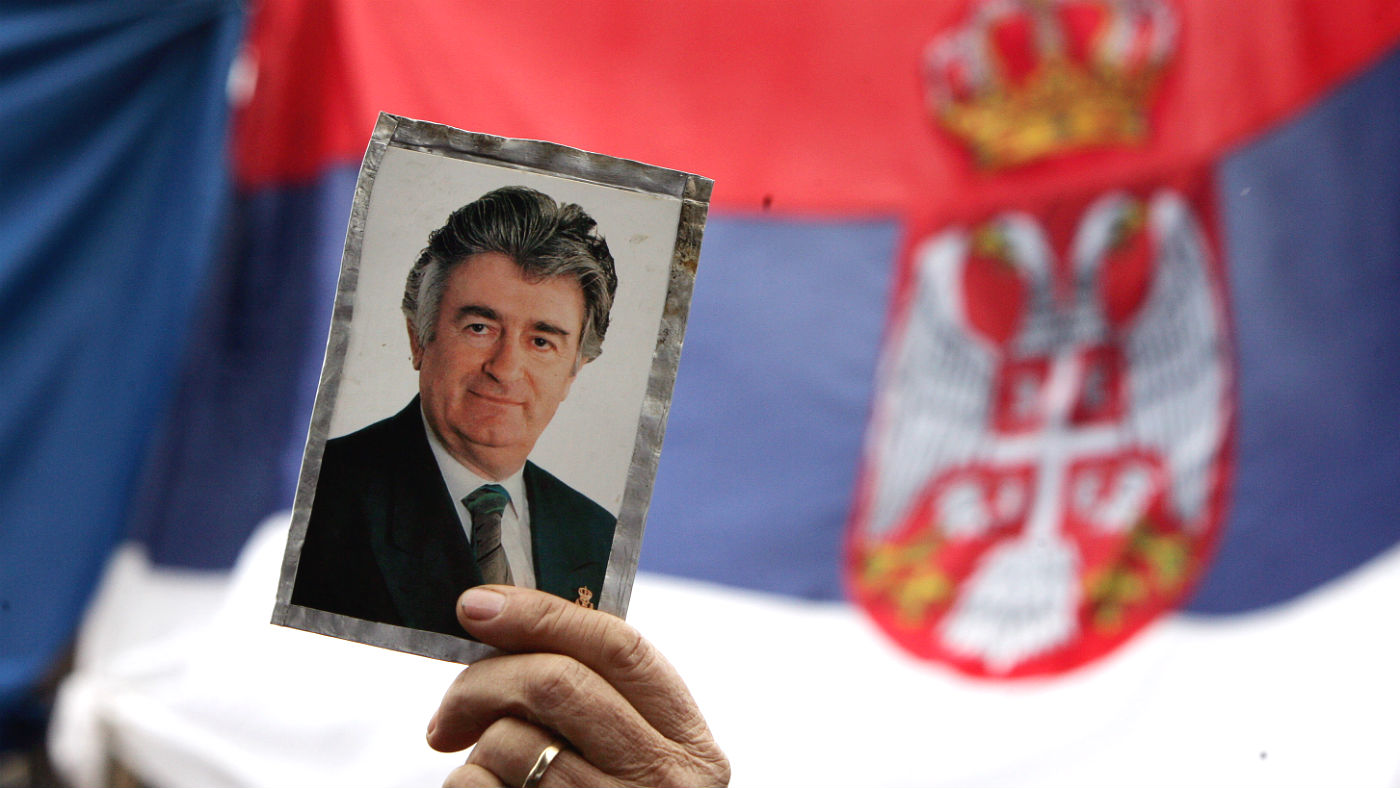How Radovan Karadzic’s legacy lives on
The man who planned Srebrenica massacre of July 1995 has become an iconic figure among rightwing extremists

A free daily email with the biggest news stories of the day – and the best features from TheWeek.com
You are now subscribed
Your newsletter sign-up was successful
The former leader of the Bosnian Serbs has had his sentence for war crimes increased to life in prison, more than two decades on from the worst post-WWII atrocity in Europe.
A UN tribunal in The Hague found Radovan Karadzic, now 73, guilty of genocide and handed him a 40-year sentence in 2016.
Following an appeal by the former psychiatrist turned military leader, the tribunal has now ruled his sentence was too lenient.
The Week
Escape your echo chamber. Get the facts behind the news, plus analysis from multiple perspectives.

Sign up for The Week's Free Newsletters
From our morning news briefing to a weekly Good News Newsletter, get the best of The Week delivered directly to your inbox.
From our morning news briefing to a weekly Good News Newsletter, get the best of The Week delivered directly to your inbox.
The judges upheld the charge of genocide for the July 1995 massacre of more than 7,000 Muslim men and boys at Srebrenica, the worst single atrocity in Europe since the end of the Second World War.
It is “likely to be one of the last remaining hearings stemming from the bloody break-up of the former Yugoslavia in the 1990s”, says the BBC.
Politico notes the decision “marks the end of a protracted legal battle”.
Karadzic, who spent years in hiding as a spiritual healer following the end of hostilities in the mid-1990s, was captured in 2008 and has been held in the Hague ever since.
A free daily email with the biggest news stories of the day – and the best features from TheWeek.com
He is one of the most senior figures tried by the Hague war crimes court, and “his case is considered as key in delivering justice for the victims of the conflict, which left over 100,000 people dead and millions homeless”, reports the Daily Mail.
Bosnian Serb army commander Ratko Mladic, dubbed the “Butcher of Bosnia”, has been handed a life sentence on similar charges, while Bosnian Croat general Slobodan Praljak, killed himself in November 2017 by taking poison in the courtroom after his 20-year sentence was upheld.
Former Serbian president Slobodan Milosevic died in 2006 while on trial in the Hague.
Claiming the ruling “sends out a powerful message to the world”, Amnesty International’s Europe deputy director, Massimo Moratti, stressed “we should not forget, however, that almost two-and-a-half decades after the Bosnian War, thousands of cases of enforced disappearances are still unresolved, with a disturbing lack of political will still blocking access to justice, truth and reparation for victims”.
Despite evidence Karadzic oversaw a massive programme of ethnic cleansing, a quarter of a century on his “legacy has lived on in Bosnia”, says The Guardian.
The paper says he “is still hailed as a hero and martyr by many Serbs” and his justification of ethnic cleansing as a defence of western civilisation against Muslim encroachment “has made him an iconic figure among some violent rightwing extremists”.
Nor is his influence limited to the Balkans.
The suspect in last week’s deadly mosque attack which claimed the lives of 50 people in New Zealand is reported to have listened to a Serb ballad extolling Karadzic’s leadership en route to the killing spree.
-
 How the FCC’s ‘equal time’ rule works
How the FCC’s ‘equal time’ rule worksIn the Spotlight The law is at the heart of the Colbert-CBS conflict
-
 What is the endgame in the DHS shutdown?
What is the endgame in the DHS shutdown?Today’s Big Question Democrats want to rein in ICE’s immigration crackdown
-
 ‘Poor time management isn’t just an inconvenience’
‘Poor time management isn’t just an inconvenience’Instant Opinion Opinion, comment and editorials of the day
-
 Epstein files topple law CEO, roil UK government
Epstein files topple law CEO, roil UK governmentSpeed Read Peter Mandelson, Britain’s former ambassador to the US, is caught up in the scandal
-
 Iran and US prepare to meet after skirmishes
Iran and US prepare to meet after skirmishesSpeed Read The incident comes amid heightened tensions in the Middle East
-
 Israel retrieves final hostage’s body from Gaza
Israel retrieves final hostage’s body from GazaSpeed Read The 24-year-old police officer was killed during the initial Hamas attack
-
 China’s Xi targets top general in growing purge
China’s Xi targets top general in growing purgeSpeed Read Zhang Youxia is being investigated over ‘grave violations’ of the law
-
 Panama and Canada are negotiating over a crucial copper mine
Panama and Canada are negotiating over a crucial copper mineIn the Spotlight Panama is set to make a final decision on the mine this summer
-
 Why Greenland’s natural resources are nearly impossible to mine
Why Greenland’s natural resources are nearly impossible to mineThe Explainer The country’s natural landscape makes the task extremely difficult
-
 Iran cuts internet as protests escalate
Iran cuts internet as protests escalateSpeed Reada Government buildings across the country have been set on fire
-
 US nabs ‘shadow’ tanker claimed by Russia
US nabs ‘shadow’ tanker claimed by RussiaSpeed Read The ship was one of two vessels seized by the US military